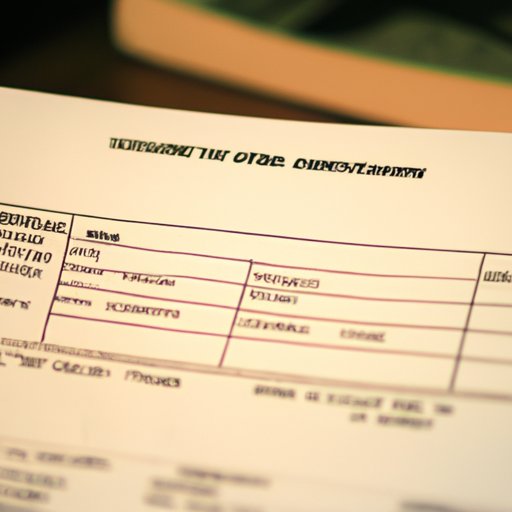Introduction
Financial accounts are essential for managing money. They provide a secure location for storing and transferring funds, as well as offer access to various services, such as paying bills, investing, and more. Knowing what a financial account is and how to use it can help you make the most of your finances.
Definition of Financial Accounts
A financial account is an arrangement between an individual or business and a financial institution. It is used to store money and transfer funds. Financial accounts can be opened at banks, credit unions, and other financial institutions. Depending on the type of account, they may also provide access to additional services, such as online banking, loans, investments, and more.

Overview of How to Manage Financial Accounts
Managing financial accounts involves several steps. These include opening the account, monitoring activity regularly, setting up automatic payments, and considering automated investing. It’s important to understand each step in order to make the most of your financial accounts.
Types of Financial Accounts
There are several types of financial accounts, each with its own features and benefits. The most common types are checking accounts, savings accounts, investment accounts, and retirement accounts.
Checking Accounts
Checking accounts are the most basic type of financial account. They are designed for everyday transactions, such as depositing paychecks, making purchases, and paying bills. Checking accounts typically offer easy access to funds and may come with additional features, such as debit cards, online banking, and overdraft protection.
Savings Accounts
Savings accounts are designed to help people save money. They offer higher interest rates than checking accounts, but have restrictions on how often and how much money can be withdrawn. Savings accounts are also FDIC-insured, meaning that deposits up to $250,000 are insured by the federal government.
Investment Accounts
Investment accounts allow people to invest in stocks, bonds, mutual funds, and other investments. They are designed for long-term savings, and typically offer higher returns than other types of accounts. However, they also involve more risk and require more knowledge of the markets and investments.
Retirement Accounts
Retirement accounts are designed to help people save for retirement. They come in two main forms: 401(k)s and IRAs. Both offer tax advantages, allowing people to save more money for retirement than they would be able to with a regular savings account.

Benefits of Having a Financial Account
Having a financial account can provide numerous benefits. Here are some of the most common ones:
Access to Money
One of the primary benefits of having a financial account is access to money. With a checking or savings account, you can easily deposit and withdraw funds. This makes it easier to pay bills and access funds when needed.
Interest Earned
Many financial accounts offer interest on the money deposited. This means that you can earn money simply by having money deposited in the account. The amount of interest earned depends on the type of account and the amount deposited.
Security and Protection
Financial accounts also provide security and protection. Most accounts are FDIC-insured, which means that deposits up to $250,000 are protected by the federal government. Additionally, many accounts offer fraud protection, which helps protect against unauthorized charges.
Setting Up a Financial Account
Setting up a financial account is relatively simple. Here are the steps to take:
Gather Necessary Documents
The first step in setting up a financial account is gathering the necessary documents. This includes a valid form of identification, such as a driver’s license or passport, as well as proof of address. Other documents may be required, depending on the type of account.
Choose an Institution
Once you have the necessary documents, you need to choose an institution. There are numerous options, including banks, credit unions, and online banks. Consider factors such as fees, interest rates, and customer service when choosing an institution.
Open the Account
Once you’ve chosen an institution, you can open the account. You’ll need to provide the necessary documents and information, such as your name, address, and Social Security number. Once the account is opened, you’ll be able to start using it.
Managing Your Financial Account
Once you’ve opened a financial account, it’s important to manage it properly. Here are some tips for managing your account:
Monitor Activity Regularly
It’s important to monitor your account activity regularly. This will help you stay on top of any fraudulent activity or unauthorized charges. Most financial institutions offer online banking and mobile apps that make it easy to check your account activity.
Set Up Automatic Payments
Setting up automatic payments can help you avoid late fees and penalties. Many financial institutions offer automatic payment options that make it easy to pay bills on time. Additionally, some accounts offer budgeting tools that can help you track your spending and stay on top of your finances.
Consider Automating Investing
If you have an investment account, consider automating your investments. Automated investing takes the guesswork out of investing and can help you reach your financial goals faster. “Automated investing makes it easier to invest regularly and consistently,” said Paul Ruedi, a certified financial planner. “It takes the emotion out of investing and helps you stay focused on your long-term goals.”
Conclusion
Financial accounts are an important part of managing your money. They provide access to money, allow you to earn interest, and offer security and protection. Setting up a financial account and managing it properly can help you make the most of your finances.
In conclusion, having a financial account is essential for managing money. Knowing the different types of financial accounts, their benefits, and how to manage them can help you make the most of your finances. Take the time to research and understand financial accounts so you can make the best decision for your needs.
(Note: Is this article not meeting your expectations? Do you have knowledge or insights to share? Unlock new opportunities and expand your reach by joining our authors team. Click Registration to join us and share your expertise with our readers.)
